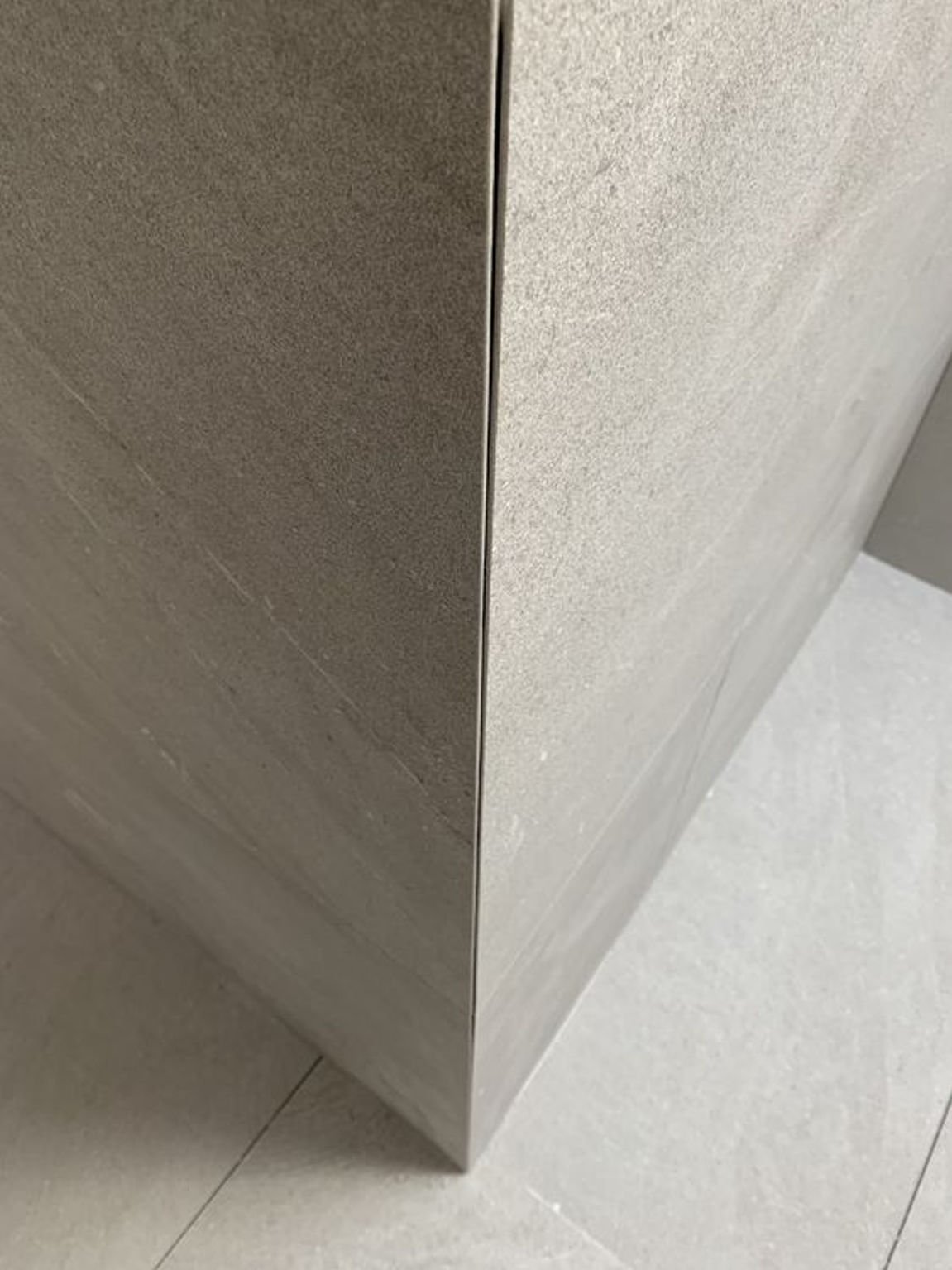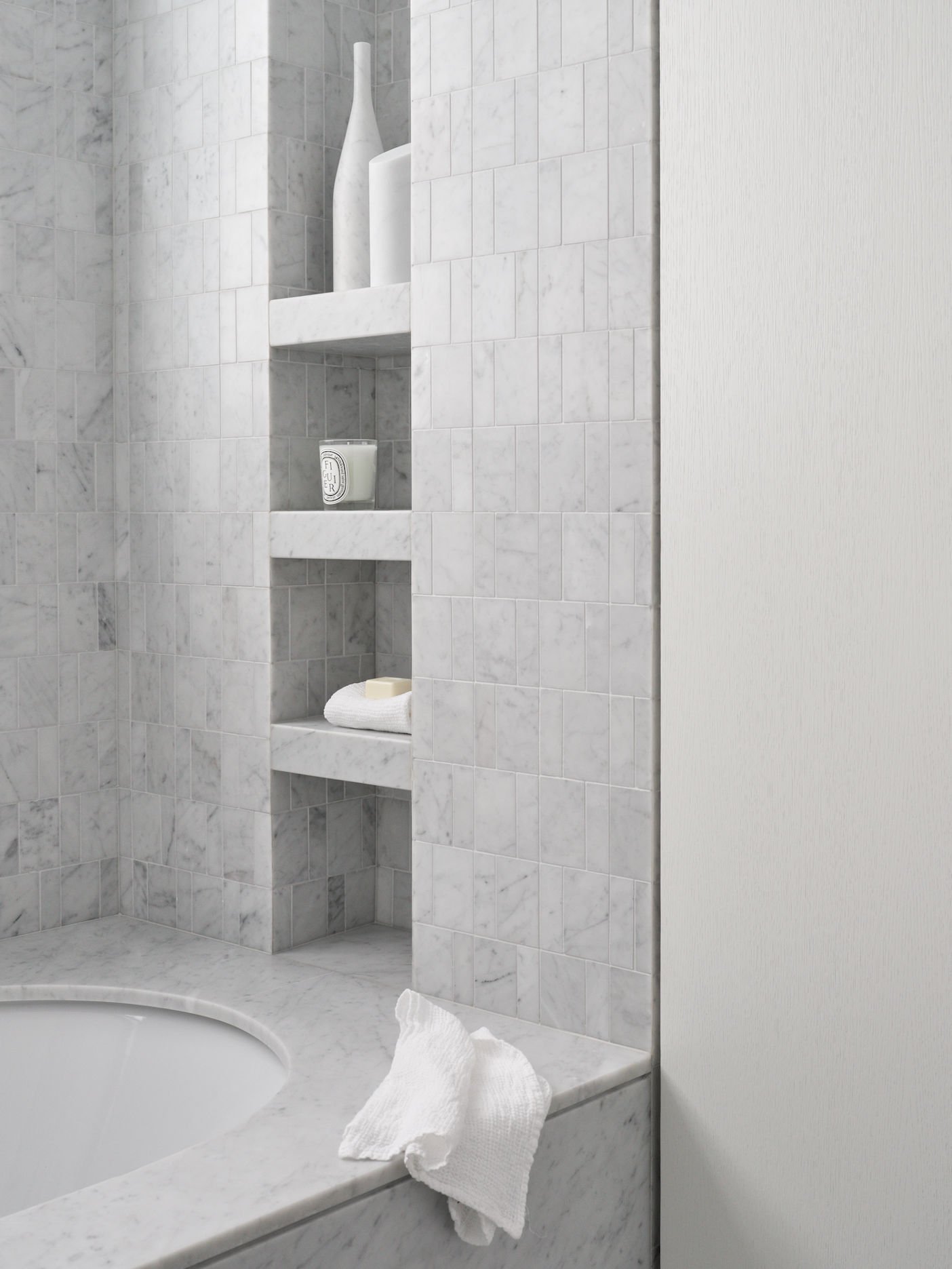7 Questions To Ask When Visiting A Tile Shop
Ready to nail your home renovation? Let’s discuss one of the most important decisions: choosing the right tiles!
And that’s because tiles usually cover large surface areas in our homes, and so play a pivotal role in setting the style and mood in a space.
And the decisions you’ll need to make go further than just tile colour and texture — there are mitred edges to consider, indoor-outdoor flow, and of course, tile grout.
But don’t sweat, because from practical considerations to creating your perfect aesthetic, we’ve put together seven BIG questions you should be asking when you’re ready to choose tiles…
Tecture • Minimalist bathroom with Terrazzo Tiles and Floating Vanity
Are these tiles for walls + floors?
Picture this: You’ve just walked into the tile showroom and found the perfect tile — yassss! But, it turns out that it’s a wall tile that can’t be used on the floor.
Generally speaking, all floor tiles can be used to tile walls or vertical surfaces, but it’s not always the case the other way around. Tiles that are specifically classed as wall tiles are generally only suitable for tiling walls because they lack the durability of a floor tile.
Wall tiles are generally thinner, softer and more decorative in nature, making them prone to cracking or breaking if exposed to foot traffic or weight. Wall tiles may also not have the necessary slip resistance required for floor applications, posing safety concerns, especially in wet areas like bathrooms or kitchens.
If you’re looking to create a sleek, seamless transition of tiles from floor to wall, you’ll need to ask a few questions to make sure that your chosen tile can be used on both vertical and horizontal surfaces.
Zephyr and Stone • Hamptons Powder Room with Grey Marble Tiles
2. Can these tiles be mitred?
A mitred finish is when two tile ends are cut at 45-degree angles and and the angles are pressed together to form a seamless ‘tiled corner’. Mitred tiles provide a premium look and finish in a bathroom, and are our preference for our own design projects because they result in a minimal, polished design which showcases the tiles beautifully.
Mitred edges require skilled craftsmanship and precision cutting, and your tiler will generally charge an additional fee, calculated per lineal meter, due to the time and labour required to achieve flawless tile mitres . A common, budget-friendly alternative to mitres is the use of a metal or aluminium tile trim to cover and finish the tiled corner, and protect the tile edge from cracking and chipping.
Z+S Tip • If mitres are on your agenda, choose stronger tiles like porcelain or stone which will achieve a cleaner cut + neater finish than ceramic tiles.
Zephyr and Stone • Bathroom Design with Mitred Tile Edge Detail Before Silicone Application
Lawless & Meyerson • Marble Bathroom Tiles with Built-in Shelves
3. Are these tiles rated for wet areas?
A floor tile’s a floor tile, right?
Wrong. Floor tiles are rated based on their slip resistance, which is important to prevent slips and falls, especially in wet areas.
Are your new tiles being used in a shower or bathroom? Or maybe a living space that will see wet foot traffic from the pool? It’s crucial that tiles in these areas are suitable (and importantly PRACTICAL) for use. For these areas, you’ll be looking for tiles with a suitable or higher slip resistance rating, so your floor tile choice meets any local building codes or regulations.
sketchArc • Neutral Bathroom Design with Fluted Shower Screen
4. Is there a matching exterior tile?
Found the perfect internal tile? Awesome!
Now, check if it comes in an exterior finish so you can continue it outdoors and achieve a seamless flooring transition from inside to out.
Matching your interior and exterior floor tiles not only makes your home feel more luxurious, it also makes the combined spaces feel larger and more spacious, creating visual flow to achieve that coveted interior-designed look.
5. Is there a matching feature tile?
The bathroom trend of installing a bold, coloured feature wall is behind us, and it’s being replaced with textured and patterned feature tiles in the same tile colour and range as your main floor and wall tiles. This creates a modern yet timeless, eye-catching design feature for contemporary bathroom renovations.
Many tiles are available in a variety of sizes, shapes and profiles in the same colour, ranging from tiny mosaics to large 600x600mm or 600x1200mm tiles. This means that you can play with size and shape while maintaining a neutral colour palette, to create a modern bathroom tile design for your home.
Z+S Tip • Using the same coloured tile in 2 different sizes in a bathroom is the foolproof formula to creating your own interior designed space.
Zephyr and Stone • Coral House Ensuite with Timber Vanity
6. Are these tiles rectified?
Do you know those stunning images on Pinterest where the tiles look like they have hardly any grout? That’s possible because the tiles are rectified.
Rectified tiles are mechanically crafted from porcelain or ceramic to be very uniform in size and length creating sharp, clean edges that are perfect for modern home designs.
Because of the extra processes they go through when being made, rectified tiles are usually more expensive, but will give you a more premium look. Your tiler can lay rectified tiles closer together so that you end up with a thin 1.5mm grout line making your tiles the star of the show, rather than the grout!
Zephyr and Stone • Resort Kitchen with Light Grey Rectified Floor Tiles
7. Can I look at grout colours?
Choosing your grout colour at the same time as your tiles at the tile shop will save you having to make last-minute decisions onsite. This means you won’t end up with the tiler choosing a colour for you, or potentially settling for a grout they have on hand.
Most tile showrooms have a range of grout brands and colours in stock, so there’s bound to be the perfect colour to match your tiles.
Z+S Tip • Choose grout like a pro — make sure you have your tiles with you to lay next to the grout samples. Then, refer back to your Finishes Schedule and design vision for the space. If you want to achieve that seamless, sleek look then you’ll want to select a grout colour that is close to your tile colour to blend in or camouflage. Or, for a bold look, go for a contrasting grout colour to make a statement design feature.
Martin Friedrich Architects • Modern Bathroom Design with Curved Tile Wall
Tile Cloud • Light Neutral Bathroom Design with Square Tiles
Ready to create a spa-like experience at home? Click this way for more Bathroom Reno How-To, Resources + Downloadable Bathroom Designs.















